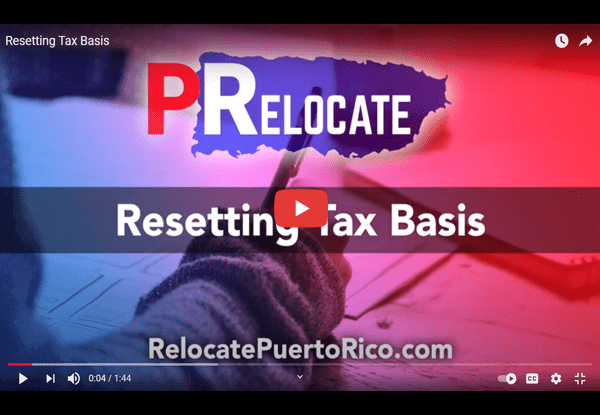Sell Assets Strategically to Best Take Advantage of Act 60 Tax Benefits
- Posted: February 19, 2021
- Posted by: Travis Lynk
- Last Reviewed: December 23, 2024

Puerto Rico is more than just the United States’ own island paradise: it also offers lucrative tax incentives to U.S. residents. Among the most popular is the Act 60 Investor Resident Individual Tax Incentive, formerly known as Act 22, which grants decree holders a 100% tax exemption on income derived from long- and short-term capital gains on publicly traded financial securities and crypto assets. As long as you maintain bona fide residency in Puerto Rico, which entails satisfying three tests, you don’t pay any taxes on your capital gains.
On top of the extra money you get to keep, the Act 60 Investor Resident Individual decree offers a unique opportunity to investors: the ability to continually sell and rebuy assets without any negative tax impacts. This allows you to reset your tax basis higher and higher, which can prove useful when the asset’s price is increasing. Though the tax basis doesn’t matter as long as the tax benefits apply to you, since you pay a 0% tax rate, setting your basis higher can be important if you lose the tax exemption benefits. This could happen for a number of reasons—for instance, your tax decree could be revoked due to non-compliance, Puerto Rico could become a state, Congress could revise the tax law to have Puerto Rican residents pay mainland taxes, Congress could change the rules to determine Puerto Rico-sourced capital gains, or the Puerto Rican government could amend the program in a way that makes compliance prohibitively expensive.
Resetting your tax basis can also help if you’re unsure whether a particular gain is sourced from Puerto Rico or the United States. If you hold a position for many years and sell it for a large gain, you may find that income subject to mainland taxes if the IRS decides you didn’t qualify as a bona fide Puerto Rican resident for the year of the gain. However, if you sell and rebuy your asset each year, you limit the risk of having to pay U.S. taxes due to IRS determinations to annual gains rather than all the gains on the asset since your initial purchase.
As long as the asset’s value increases materially, you should not experience any downside to selling and rebuying it. It should be possible to buy the asset again after just a few minutes or hours. It’s recommended to set a reminder for yourself to sell and rebuy your assets at least once each year [we recommend in December], but it would also be a good idea to do it whenever a volatile asset shoots up in price.
Before employing this strategy, we strongly recommend establishing residency in Puerto Rico and consulting a tax advisor to determine whether gains on the asset in question can indeed be considered Puerto Rico-sourced and whether federal bifurcation rules apply to it. Additionally, if you’re planning to fully commit to Puerto Rico long term—to the extent that your bona fide residency will be obvious and not disputed by the IRS—this may not be the best strategy, because if you hold an asset for 10 years and fulfill the bona fide residency requirements for the entire period, a reduced long-term capital gains rate of 5% would apply on any gains sourced in the United States prior to establishing Puerto Rico residency. This reduced 5% rate is substantially lower than the normal capital gains rate for long-term capital gains sourced exclusively in the United States, which as this publication date of this post varies between 18.8%-23.8% with the full Medicare Contribution Tax.
Disclaimer: Neither PRelocate, LLC, nor any of its affiliates (together “PRelocate”) are law firms, and this is not legal advice. You should use common sense and rely on your own legal counsel for a formal legal opinion on Puerto Rico’s tax incentives, maintaining bona fide residence in Puerto Rico, and any other issues related to taxes or residency in Puerto Rico. PRelocate does not assume any responsibility for the contents of, or the consequences of using, any version of any real estate or other document templates or any spreadsheets found on our website (together, the “Materials”). Before using any Materials, you should consult with legal counsel licensed to practice in the relevant jurisdiction.
More Articles
-
Buying and Servicing a Car in Puerto Rico

Read MoreDecember 23, 2022 -
The importance of motivating local businesses

Read MoreOctober 8, 2020



